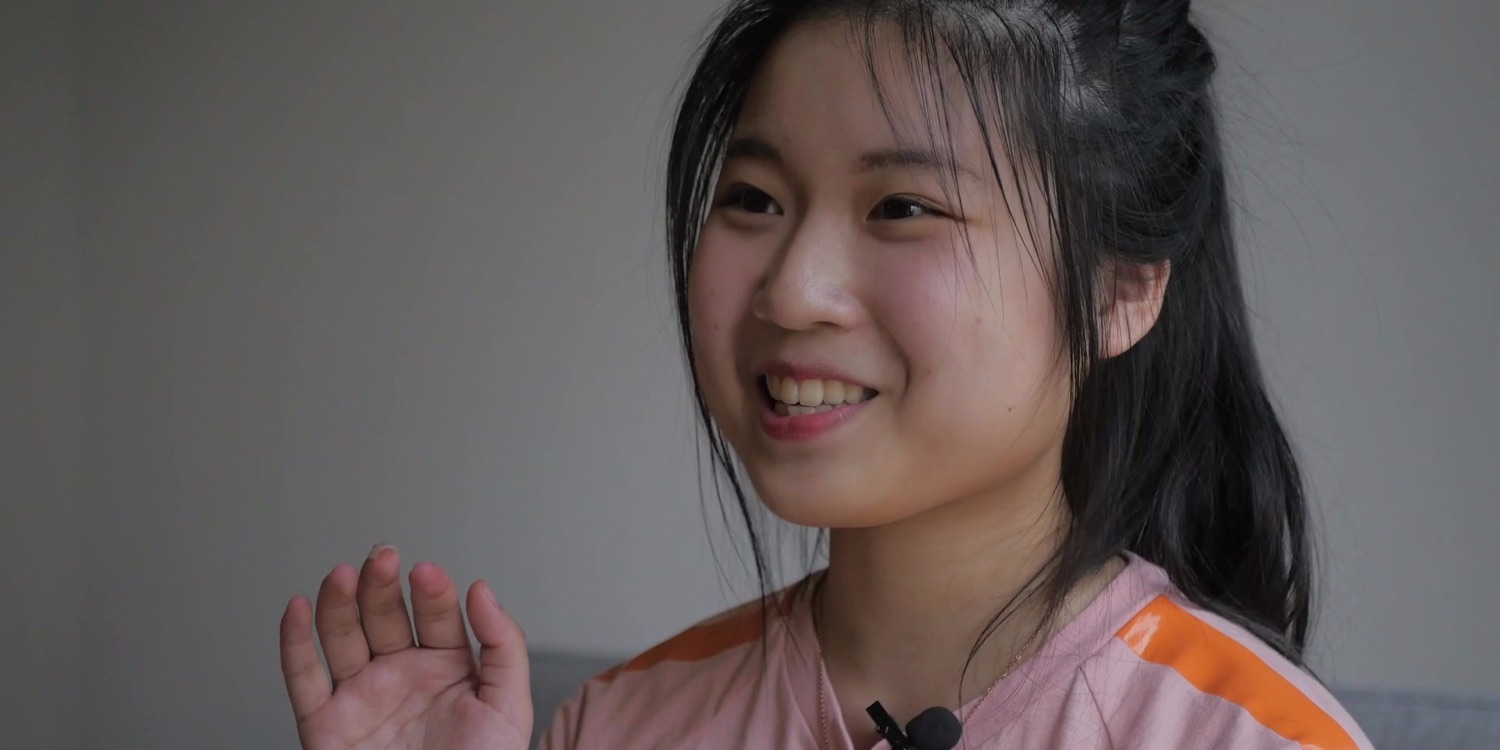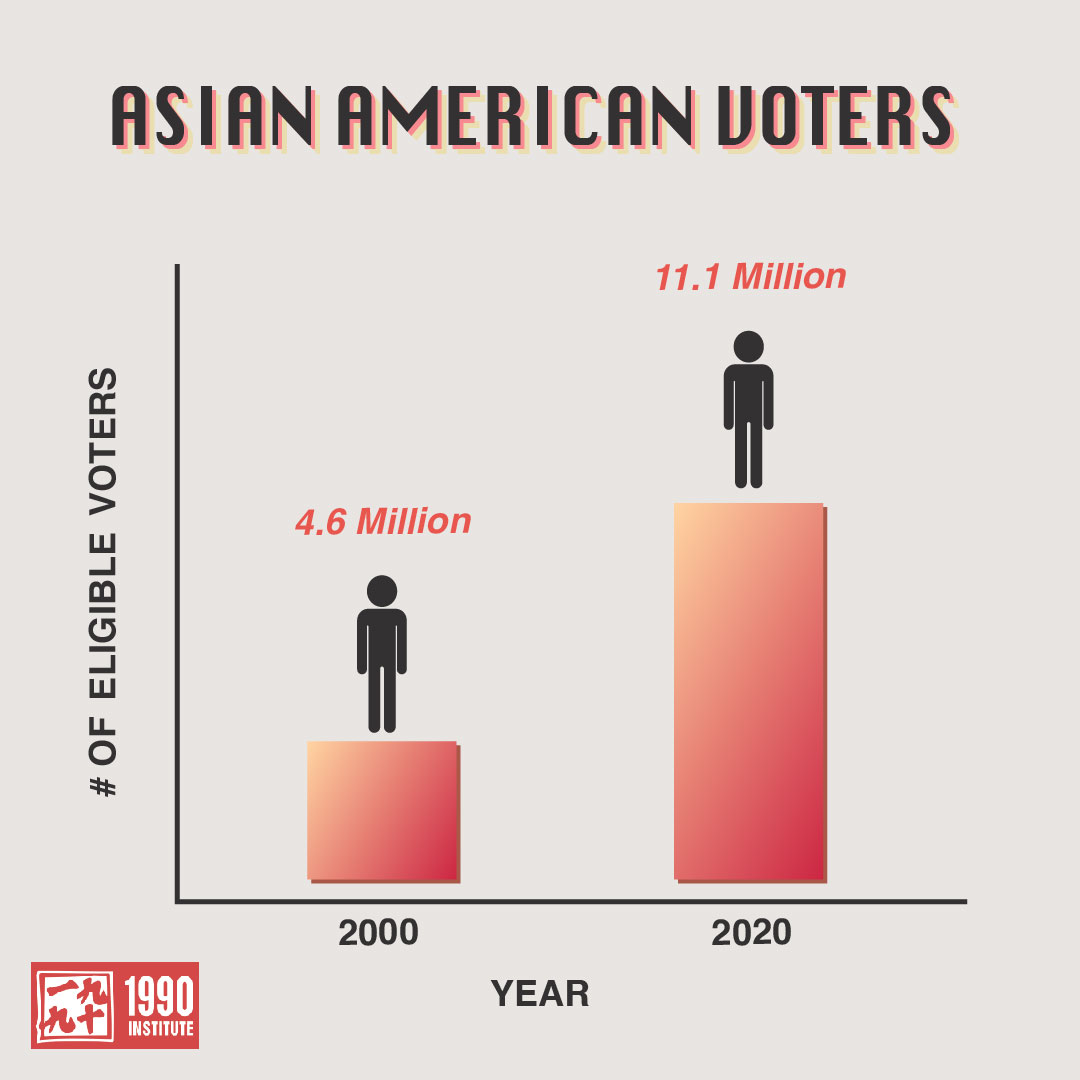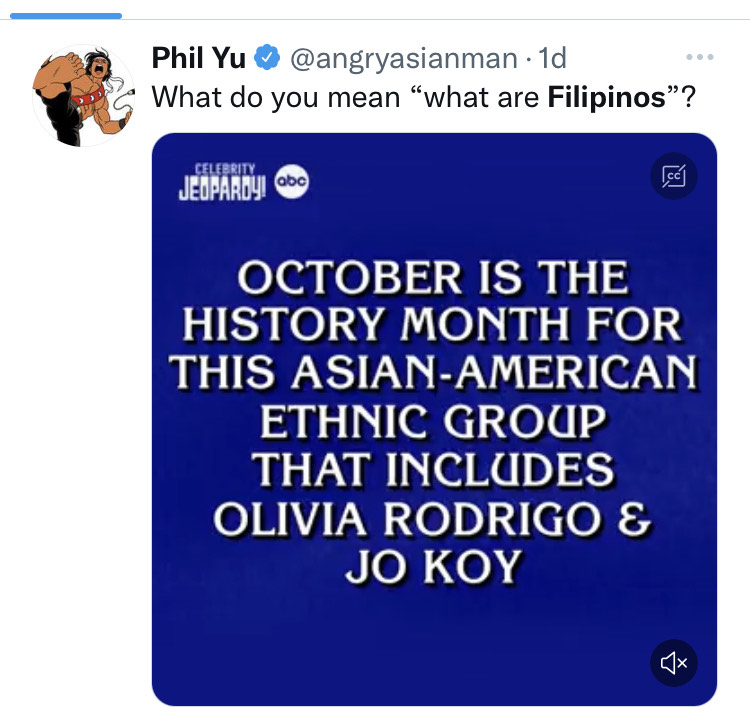| | | | Dear Friends, Happy Diwali and Halloween! What Asian American superhero will you be dressed up as? Check out our Spotlight section below to see what’s new at the 1990 Institute. Have you heard of China’s challenging college entrance exam called the gaokao? We have a new video exploring the impact of this formidable test on three Chinese high school students. We’re also continuing our profiles for Filipino American History Month on New Asian American Voices and encouraging everyone to vote on Election Day in our video called “Our Voice Matters.” Thanks for your continued support of the 1990 Institute and newsletter. Please share this newsletter with your friends and family and encourage them to subscribe. |
| |  |
|
| | | How can our Asian American vote help to unite rather than divide us? By Frances Kai-Hwa Wang Our history as Asian Americans began when the first Filipinos arrived at Morro Bay on California’s coast in October 1587, before the United States was even a country. As the Spaniards explored this new land, the Filipinos walked in front. Centuries later, Filipino farm workers also led the way when they started the Delano grape strike in 1965, and then reached out to Latino farm workers to join forces. Civic and community engagement is not new, but we have to continuously keep engaging. Last week in southern California, signs attacking the Democratic candidate for U.S. Congress began to appear, “China’s Choice: Jay Chen,” a tired old tactic of using fear of China to target Asian American candidates. Jay Chen is Taiwanese American and a veteran in the U.S. Navy Reserves. However, the bottom corner of the signs reads, “Paid for by Michelle Steel for Congress.” The Republican candidate is a Korean American immigrant, and California District 45 is one of the most heavily Asian American districts in the country, with a large Vietnamese American population. “Steel is trying to exploit generational trauma in the Vietnamese American community,” Chen says. “These attacks are meant to incite fear and distrust in the Vietnamese community. They’re meant to reopen wounds for her own political benefit.” I worry about how much China fear mongering we have seen from candidates of both parties, especially with China President Xi’s tough talk at the Chinese Communist Party Congress and the new Stop AAPI Hate report, “The Blame Game: How Political Rhetoric Inflames Anti-Asian Scapegoating,” which examines the harms of scapegoating on Asian and Asian American communities (with recommendations for political candidates, community groups, and individuals who want to help end this). According to a new Pew Research Center report, 13.3 million Asian Americans will be eligible to vote in this election. That is 5.5 percent of all eligible voters! And up 9 percent since 2018! Asian Americans are also the fastest growing racial or ethnic group in the U.S. electorate. The majority of Asian American eligible voters live in five states; California has the highest number of Asian American eligible voters (4.2 million), followed by New York (1.1 million), then Texas (930,000), Hawaii (565,000), and New Jersey (505,000). Voting has already started in many states, and the Asian American vote can make a difference. A new documentary by the Center for Asian American Media aired this week on PBS, “Rising Against Asian Hate: One Day in March.” It investigates the shooting deaths of six Asian American women in Atlanta in March 2021 and shows how the community came together in response in Atlanta and nationally, and at the polls. In the film, a Filipina American woman named Elsa speaks at a community event, “In the neighborhood when people are thinking about where the virus has come from, they think we are all Chinese. When one of us Asians gets hurt, we all suffer and we all feel the pain. So let’s all get together and work together to stop this Asian hate crime.” |
| |
|
| | How L.A.'s Little Manila Disappeared Without a Trace | KCET "Literally, Little Manila was erased by virtue of redevelopment," said Filipino American Gerald Gubatan, an urban planner for the City of Los Angeles. "And what do we have left except our own memories?" For 1st time, names of Japanese Americans incarcerated during WWII are collected. Families stamp them in emotional tribute. | NBC News “You just see one name there, but that name represents a whole life, a whole family — generations," said Nan Okada, who was sent to a prison camp at age 4. Ahead of midterms, politicians warn against using China rhetoric that scapegoats Asians | NBC News “Leaders, like it or not, are role models, and they have a large platform. So it is really important that we are careful and nuanced with the words that we use,” Rep. Grace Meng said. New Documentary ‘Rising Against Asian Hate’ Captures an Unprecedented Moment | Center for Asian American Media “The Asian American community are not victims in this story,” said director Titi Yu. “The Asian American community [has] been here fighting for their civil rights for a very, very long time." Right-wing disinformation ramps up on WeChat ahead of midterms, report finds | NBC News Researchers say failing to address the narratives could have a significant impact on Asian American voters in November. Chinese President Xi tightens grip on authority amid fears of a return to one-man politics | PBS NewsHour The Communist Party’s 20th National Congress will see a shake-up of the country’s leadership but the top job is all but secured with President Xi Jinping to remain at the helm. These are 4 key points from Xi's speech at the Chinese Communist Party congress | NPR Xi trumpeted the party's achievements since he came to power a decade ago and outlined principles for party rule and policies in the years to come. Explainer: What is the Chinese Communist Party’s 20th national congress? | South China Morning Post The upcoming congress is expected to be the most significant political event for China in decades. It is the first since the US-China fall out, the Covid-19 pandemic, war in Ukraine and the latest Taiwan crisis. Explainer: How did Xi Jinping rise to power in China? | South China Morning Post From political princeling to the People’s Leader, Xi Jinping is arguably China’s most powerful ruler since the death of Chairman Mao Zedong in 1976. Ignored in Life, Bernice Bing Is Discovered as Museums Rewrite History | New York Times Scholars and curators are beginning to focus on long-overlooked Asian American artists, acknowledging their importance in the narrative of American art. Supreme Court declines to consider overturning racist 'Insular Cases' | NBC News The justices rejected a case seeking birthright citizenship for American Samoans.
|
| |  | Asian Americans are the fastest growing racial or ethnic electorate and have tremendous untapped power in elections.
Find out why “Our Voice Matters" in our video on the Asian American vote. |
|
|
| | -
VIDEO: THE CHINESE GAOKAO EXAM AND ITS SHARED IMPACT OF ON THE LIVES OF CHINESE HIGH SCHOOL STUDENTS – Did you know that the standardized test used for college admissions in China is often considered to be the most intimidating college entrance test in the world? Known as the gaokao, taking this exam is an experience shared by almost every high school student in China. Why do the test results have such a strong impact on students’ future careers? How do teenagers navigate the test-taking process and is there a way to improve their results or avoid the test and still attend a university? Find out how Chinese high school students navigate through and around the gaokao in our new video launching today: “What is Gaokao? The World’s Toughest College Admissions Test.” See it now on our YouTube channel. -
NEW ASIAN AMERICAN VOICES: CELEBRATING FILIPINO AMERICAN HISTORY MONTH – This week, we have a profile of American farmworker and labor activist Philip Vera Cruz on New Asian American Voices. He was born in the Philippines in 1904 in the generation known as manongs: Filipino Americans, mostly bachelors, who came to the U.S. in the 1920s and 30s and often found work in the agriculture industry under strenuous conditions and low pay. In 1965, he was a leader in the Agricultural Workers Organizing Committee (AWOC), representing primarily Filipino American workers, and tasked with generating support for the Delano Grape Strike. He traveled the country and raised awareness for the strike which lasted five years. Learn more about this unsung hero and see additional profiles on New Asian American Voices. -
VIDEO: "OUR VOICE MATTERS" ON ELECTION DAY, NOVEMBER 8 – Does one vote matter? Yes! See our video on voting that summarizes how Asian Americans have had low voter turnout in the past, but have the numbers to make a difference and the power to influence the outcome. No matter your political preferences, you have the right to have your voice heard by Election Day, and early voting will soon be available if you choose to drop off or mail in your ballot. While some states’ voter registration deadlines have passed, many others are fast approaching – for example, in California, the voter registration deadline is October 24, and early voting will begin 10 days prior to November 8. Find voter registration deadlines and early voting locations at vote.org, and see what’s on the ballot and more at apiavote.org. Watch “Our Voice Matters” on our YouTube channel. - WEBINAR: THE SUCCESS OF ALIBABA AND LESSONS FOR BROADER U.S.–CHINA BUSINESS RELATIONS – Our Board member, Brian A. Wong, a long-time Alibaba executive and former special assistant to Jack Ma, discusses his new book, "The Tao of Alibaba: Inside the Chinese Digital Giant That Is Changing the World," in a new webcast presented by Asia Society Texas and Northern California. He shares how Alibaba has navigated tough times and discusses how the company’s management principles can provide a business and economic development model for U.S. and global corporations doing business with China. Tune in for the live video webcast on YouTube on November 7 at 8:30 pm ET / 5:30 pm PT.
|
| | Dim Sum - A Little Bit of Heart |
|  | |
|
|
|
| | | | 1990 Institute
P.O. Box 383 | San Francisco, California 94104
contact@1990institute.org www.1990institute.org Copyright 2022, The 1990 Institute. All rights reserved. |
| | | |
|
| |
|
|